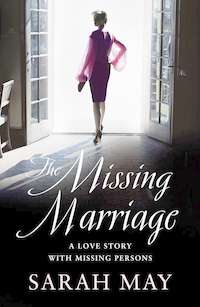
Полная версия
The Rise and Fall of a Domestic Diva

By the same author
The Rise and Fall of the Queen of Suburbia
Nudist Colony
Spanish City
The Internationals
The Rise and Fall of a Domestic Diva
SARAH MAY

This book is dedicated to all women who are either currently attempting - or who have in the past attempted - to raise children and pursue a career…at the same time. Whatever your bank balance… whatever your dress size…whatever the state of your mental health …you’re all DIVAS!
Table of Contents
Cover Page
Title Page
Dedication
The PRC
Prologue
April
Chapter 1
Chapter 2
Chapter 3
Chapter 4
Chapter 5
Chapter 6
Chapter 7
Chapter 8
Chapter 9
Chapter 10
Chapter 11
Chapter 12
Chapter 13
Chapter 14
Chapter 15
Chapter 16
Chapter 17
Chapter 18
Chapter 19
Chapter 20
Chapter 21
Chapter 22
Chapter 23
Chapter 24
Chapter 25
May
Chapter 26
Chapter 27
Chapter 28
Chapter 29
Chapter 30
Chapter 31
Chapter 32
Chapter 33
Chapter 34
Chapter 35
Chapter 36
Chapter 37
Chapter 38
Chapter 39
Chapter 40
Chapter 41
June
Chapter 42
Chapter 43
Chapter 44
Chapter 45
Chapter 46
Chapter 47
Chapter 48
Chapter 49
Chapter 50
Chapter 51
Chapter 52
Epilogue
Acknowledgements
About the Author
Praise
By the same author
Copyright
About the Publisher
- THE PRC -
THE PRENDERGAST ROAD COMMITTEE
CONTACTS LIST
Name Address Tel. Harriet Burgess 236 Prendergast Rd 020 8369 4435 Ros Granger 188 Prendergast Rd 020 8369 2311 Kate Hunter 22 Prendergast Rd 020 8369 7866 Evie McRae 112 Prendergast Rd 020 8369 4956 Jessica Palmer 283 Prendergast Rd 020 8369 4221Prologue
Deep in a valley in the heart of south London, Kate Hunter woke up suddenly among the kind of rumples only a nightmare’s sweat can give black sateen sheets. It was 4.52 a.m. She pulled the sheet up over her head, not wanting to see the early hours’ outline of their IKEA wardrobe, IKEA bed, or IKEA chest of drawers - in case she saw something else that wasn’t meant to be there; something that didn’t feature in the IKEA catalogue - excluding Robert.
The only thing she could remember about the nightmare - and it was a vivid memory - was the feeling of water beneath her. She’d been floating effortlessly until she became aware that the dress she was wearing was beginning to pull her down - was in fact weighted in some way. As soon as she became conscious of the dress, her legs fell down through the water and she started to drown.
She and Robert had argued the night before - or rather, she had argued and he had watched. This was the way they rowed these days. What had the row been about? She didn’t know any more - all she remembered was Robert sitting on the edge of the bed, looking sad and slowly undressing.
For a moment she thought it had started to rain, but it was just a dry April wind brushing through the branches of the rowan tree outside.
Peeling the still-damp sheet from her face, she watched orange streetlight and flat moonlight fall through the broken blinds and compete for space on the bedroom walls. Turning towards the unconscious hump of Robert’s back, she curled into his warmth, her fringe tickling his spine in a fragile apology as she let her nostrils fill with the scent of his skin - and drifted back to sleep.
On the brink of losing consciousness, she thought she heard a strange, sobbing scream. Her body jerked momentarily awake. One of the children? Robert’s mother - Margery - asleep on the sofa bed downstairs? Whoever it was, she wished… she wished…her right leg slipped out of the side of the bed until her toes were hovering just above the floorboards. So that it looked as though she’d been dancing.
At that moment, Robert Hunter woke up without meaning to, unsure whether it was the scream - which he’d heard in his sleep - or Kate’s hair and breath running up his spine that had done it. Rolling carefully onto his back and trying not to trap any of his wife’s hair under his shoulder blades, he listened. In his muddled, pre-dawn mind, he became convinced that Kate’s breath on his spine and the scream had conspired to wake him.
The scream unsettled him and, not entirely convinced he wasn’t still asleep, dreaming, he took himself off to the bathroom and had a perplexed, early morning wank in the shower.
Afterwards, he let his back slide down the tiles until he was crouching, hot water pounding on his bent head.
Today he was teaching Jerome.
On Tuesdays, Thursdays and Fridays, he taught Jerome - and today was a Thursday. He didn’t know when exactly it had happened, he was only aware that now he plotted his week mentally around when he did and when he didn’t teach Jerome.
There were children who got to you and then there were children who got inside you. Every teacher he knew - apart from himself, up until now - had one, and his was Jerome. When he shut his eyes he could see Jerome’s face more clearly than he could see his own son, Findlay’s, and what terrified him more than anything was that Jerome was changing him in a way nobody else had; not even Kate, not even his children… and he hated Jerome for that. He’d never been afraid of teaching before, but he was afraid now.
The dry April wind carried on making its way up Prendergast Road through the branches of winter-flowering cherries, silver birches, poplars and more rowans, past bay-fronted Victorian terraces whose drawn curtains were meant to conceal nothing more than healthy functioning families coping with life’s run-of-the-mill ups and downs. The wind knew better, but didn’t have anybody to tell.
As it brushed past No. 112 (which had featured on TV’s Grand Designs only a fortnight ago), Evie McRae - in the grip of exhaustion-induced insomnia after having scored more than a line of cocaine in her garden office - left the house with her five-month-old daughter, Ingrid, and headed for the 24-hour Sainsbury’s where she did the McRae weekly shop.
Ingrid was an abnormal baby.
She slept through the night - often for more than twelvehour stretches - leaving Evie with very little to talk to other women about. So she’d woken Ingrid up - partly because she hated spending time alone and partly in the hope that by 8.00 a.m. she would have the same shadows under her eyes as everybody else she knew - and was now pushing her, screaming, down empty aisles towards the one open checkout.
At No. 188, Ros Granger woke up in an empty bed. It was only 4.52 a.m. Martin was sleeping on the floor of his office at Curlew & Fokes where they were so stretched on the immigration case that most of the lawyers working on it were only getting a maximum of four hours’ sleep a night. After making sure the alarm was set for 6.30, she buried her face in the pillow that still smelt of him and waited to fall back to sleep. ‘I deserve to be happy,’ she said, through gritted teeth. ‘I do deserve to be happy.’
At No. 236, Harriet Burgess woke up to eight-week-old Phoebe’s still newborn-sounding screams. She had been dreaming that Miles had grown breasts and was feeding their daughter. Probably because her sister had phoned last night to tell her she’d just found out that prehistoric Irish chieftains used to symbolically breastfeed their entire kingdom - men, women and children. What sort of person knew this kind of thing? What sort of person thought other people wanted to know this kind of thing? Hauling herself out of bed, she went through to Phoebe, the sensory-triggered security camera they’d had installed in the hallway training its lens on her as she plodded past.
At the top end of Prendergast Road - beyond the crossroads with Whateley Road - Arthur Palmer, aged four and three quarters, woke up screaming. His mother, Jessica Palmer - only half awake - stumbled automatically into his room, tripping over a garage and farmyard, until her hand grasped the foot of Arthur’s bed where Arthur was sitting screaming, still asleep. He was having a night fright, the extremist form of a nightmare.
Even in the half-light, Jessica could make out the muscles on his neck as his body took the strain of fear. He looked like he did when he was having one of his bad asthma attacks and she grabbed his inhaler off the bookshelves.
As she sat down next to him on the end of the bed, closer than she wanted to, the screaming stopped.
Arthur raised his arms weakly - one hand clutching his favourite Transformer, Burke - before sinking untidily back onto the duvet.
Jessica waited, then yawned and got slowly to her feet, creeping out of the room.
In the hallway, eyes nearly shut again, she walked into her sixteen-year-old daughter, Ellie.
‘Everything okay?’ Ellie asked.
‘Oh - everything’s…yeah, it was just Arthur, one of his…one of his…you go back to bed.’
They eyed each other uneasily and, after a moment’s hesitation, Ellie walked unsteadily back into her room on her spindle legs.
‘See you in the morning,’ Jessica called out after her, hoping it sounded natural, then went back to bed herself, thinking she’d fall straight to sleep again; only she didn’t. She rolled around in the big empty bed that seemed to get bigger and emptier every night, then listened to the central heating coming on and - realising that she wasn’t going to get back to sleep until it got dark again in twelve hours’ time - got up.
Downstairs in the kitchen, she stared at her day, plotted out in blue marker pen on the whiteboard next to the fridge.
Her neighbour, Kate Hunter, was picking Arthur up from nursery at 4.30 and taking him to Swim School with Findlay then bringing him home, because Jessica had viewings booked throughout the afternoon. She yawned again as the wind changed direction outside and the fan in the kitchen window started to clack unevenly in its broken frame. When would she get round to mending that? Probably never.
Turning round, she saw the pot of chrysanthemums on the windowsill that she’d bought because she liked the colour pink they’d been in the shop. When she got them home the pink seemed different, and she couldn’t work out why she’d bought them when she’d never liked chrysanthemums anyway. Now they were half dead, the leaves and petals shrivelled.
She went over to the sink, filled an empty milk carton, and was about to water the plant when she stopped, suddenly pouring the contents of the milk carton back down the sink and lighting a cigarette instead.
She stood by the windowsill, smoking and staring at the chrysanthemums, not thinking about anything much.
Chapter 1
When Kate woke up again, an hour later, the edge of her pillow was wet, and for no reason at all her first thought was that Robert had been crying. Only Robert wasn’t even in the bed.
‘Robert?’ she called out, anxious.
‘Here,’ he mumbled.
Then she saw him, kneeling on the floor in front of the chest of drawers, the bottom drawer open.
‘I didn’t hear you get up.’ She didn’t like to think of Robert awake while she was asleep.
‘I couldn’t sleep,’ he said and carried on digging around in the drawer.
Neither of them mentioned last night’s row; the sun was shining, a new day was beginning, and there just wasn’t room for it.
‘You’re wet,’ she observed.
‘Yeah—I showered.’
‘Already? I didn’t hear the shower.’ Kate carried on watching him.
Robert scratched at his armpit then stood up suddenly.
‘What is it you’re looking for?’
‘I don’t know—I’ve forgotten. Christ…’ he added, ambivalently.
On the other side of the bedroom door they could hear Margery, who was staying with them at the moment while she had her Leicestershire bungalow repainted, irritably attempting to make a pot of tea. Everything about No. 22 Prendergast Road irritated Margery—primarily because she couldn’t believe what Robert and Kate had paid for a terraced house with neighbours on one side who weren’t even white.
The kettle started shrieking on the hob. The kettle irritated Margery—why didn’t they get an electric one? Even the water coming out through the tap irritated her, and the irritation was so intense that Kate, lying upstairs in bed, could feel it as Robert walked towards her through bars of early morning sunlight.
‘I heard someone screaming last night,’ she heard herself saying as the smashing sounds carried on downstairs. ‘I thought it might have been your mum.’ Why had she said that? She hadn’t meant to say anything about the scream in the night.
Robert, who had been about to sit down on the side of the bed and kiss her, stayed standing instead.
‘She used to do that when I was a kid,’ he said, suddenly remembering.
Still propped on her elbow, which was sinking deeper and deeper into the pillow, Kate waited for him to carry on, but he didn’t. Unexpectedly, at 6.10 on a Thursday morning, the clouds had parted and Robert had given her a picture of a small child standing outside a shut bedroom door on a cold landing in the early hours of the morning, waiting for the woman on the other side to stop screaming; hating himself for not having the courage to open the door and walk in and comfort her when he knew he was all she had.
Kate and him stared at each other, momentarily stunned. Robert never talked about his childhood. He never talked about it with Margery or other people who had been there, so why talk about it with people who hadn’t? For him, it was time that had passed—and anyway, now he was healthily involved in the direct manufacture of his own children’s childhoods.
He shrugged uncomfortably at his own transgression, then said cheerfully, ‘So—what’s on for today?’
‘Today’s the day.’
‘For what?’
‘Robert—you can’t have forgotten.’
‘What?’
‘St Anthony’s. Today we find out…whether Finn’s got a place at St Anthony’s.’ That’s what the row had been about last night—now she remembered and, pulling the pillow out suddenly from under her elbow, threw it at him.
Robert ducked and the pillow went crashing into the already broken blind, breaking another three slats.
‘God, I hate those fucking blinds.’
Kate was trying to decide whether he was genuinely angry or not when she heard Flo, on the other side of the bedroom wall, starting to cry.
‘Princess is up,’ Robert said.
Ignoring this, Kate hauled herself automatically out of bed and said, ‘Well, let’s hope we don’t have to sell the house or anything.’
‘Why would we need to sell the house?’
‘It’s the only viable option,’ she carried on.
‘Viable option for what?’
‘Getting Finn into St Anthony’s. This end of Prendergast Road isn’t guaranteed catchment area.’
‘But isn’t that why you’ve been dragging him to bloody church every Sunday since before he could talk, and why you—’
Kate started to speak over him. ‘Beulah Hill’s guaranteed. Jessica’s been telling me about this place that’s been on the market for over a month now—and it’s a hundred and twenty thousand cheaper than what we’d get for this so we’d actually make some money,’ she said, realising as she looked at Robert’s face that this was the first time either of them had openly acknowledged that they needed to. ‘What d’you think?’ she said after a while, over Flo’s increasingly loud and peculiar bleating sounds. Even after six months, the bleating still sounded odd to Kate.
She smiled absently at him as he walked over, put his hands on her shoulders, eventually kissed her and said quietly, ‘I think that’s fucking nuts.’
‘But, Robert—’
‘If we need to talk about our finances—’
‘Our finances?’ Kate started to laugh.
The laughter was ambiguous. Now he was anxious and over the past six months, which had been difficult—although the word ‘difficult’ didn’t do justice to their marriage so far, so he’d avoided using the word—anxiety had become the third person in their marriage, making it an unpredictable ménage à trois.
There was a scratching at the door and Margery’s voice, ‘Flo’s awake—do you want me to feed her?’
‘It’s fine,’ Kate said, ‘I’m just coming.’
How long had Margery been there? It was difficult to tell; she’d perfected the art of creeping soundlessly around the house. Sometimes, when Kate came back from work, she thought the house was empty until Margery appeared at random, framed in a doorway Kate was about to walk through, claiming to have been asleep.
‘She’s really working herself up.’
‘Mum—it’s fine,’ Robert cut in.
Margery paused. ‘Morning, love.’
‘Morning, Mum,’ Robert called back, watching Kate pull on some black pants that had gone threadbare at the back.
‘D’you want tea—I’ve just made some?’
‘We’re fine.’
‘There’s plenty in the pot.’
‘It’s okay—we’re coming down now.’
When Kate appeared five minutes later, Margery was still hovering on the landing.
‘I didn’t like to leave her in case she was choking or something.’ Margery paused, as if the fatal choking had already taken place, adding, ‘She’s only six months.’
Kate disappeared into Flo’s room and, as she lifted her daughter—now bleating hysterically—out of her cot, Margery, who was still in the doorway, said again, ‘She’s only six months.’
Kate stared at the rhinoceros on Flo’s safari curtains, pulled over the Gina Forde-recommended blackout blinds, rhythmically stroking her daughter’s back, aware of every bump in her unformed animal spine, and didn’t say anything.
She didn’t know how long she’d been standing like that, but when she at last turned round, Margery was gone and the house was full of the smell of economy bacon frying in the water it had been injected with at the processing plant.
Kate crossed the landing, walking through the toxic bacon fumes with Flo towards Findlay’s room. Findlay was up, kneeling intently on the floor. His bed looked as though it had barely been slept in.
‘I’m building a world,’ he said, without looking up from the piles of Lego he had heaped on the rug in front of him—the Lego obscuring the Calpol stains that raising Findlay for the first four and a half years of his life had cost her so far.
‘We need to get you dressed,’ Kate said vaguely, over Flo’s body draped across her shoulder.
‘Okay,’ Findlay agreed, standing up in a manner that was efficient rather than obedient, and that already lured her into confiding in him things about the world and the people in it that she wasn’t convinced he was ready to hear yet.
‘Should I wear my Spiderman suit?’
‘Oh, Finn…’
‘I should,’ he insisted.
‘But you’ve worn that nearly every day this week—it’s filthy.’
He thought about this for a fraction of a second. ‘But I should,’ he said again. Then, ‘Is it okay?’
Kate felt as though Findlay was prompting her, and when she finally nodded at him, he smiled back at her as if they’d just consented to take a huge leap forward in cross-cultural understanding.
Unnerved, Kate made a show of efficiency, opening curtains, making the bed—all with one hand. ‘But not the mask—they won’t let you wear the mask to nursery.’
Findlay watched approvingly as she helped him into the Spiderman suit while listening to what was going on downstairs. Had Robert, who didn’t mind the economy bacon sandwiches as much as he pretended, finished making his way through the rashers leaking white residue, layered between Blue Ribbon margarine and two slices of Mighty White? She hadn’t heard him come back upstairs and he hadn’t brought her a cup of tea yet—a ritual observed every morning since the first time they woke up together.
Downstairs, Margery, who had been outraged when she’d discovered that Robert was expected to help himself to a bowl of cereal—when there was any—at breakfast, before a full day’s work, was overwhelmed with pride that now she was here she could send him out into the world with meat in his stomach as well as a greasy chin and cuffs. That was one wrong in this marriage she’d been determined to set to rights.
She trailed after him now to the front door, in a grey tracksuit she’d been given by American Airlines on one of her Florida trips when her luggage got lost, and waved frantically as he cycled off down the street—until he turned the corner, out of sight. Then she sighed involuntarily, stared threateningly at the innocent commuters passing No. 22 on their way to the station, and shut the front door quickly before the Jamaican next door saw her standing there and decided to rape her. According to the free paper they got at home, The New Shopper, these things happened in BROAD DAYLIGHT in London, and nobody lifted a finger to help.
When she turned round, Kate was standing at the foot of the stairs, watching her.
‘He’s gone,’ Margery said, fairly certain from the look on Kate’s face that this was the first—or one of the first times, anyway—that Robert had left the house in the morning without saying goodbye. Had the Hunter marriage entered a new phase, and would she—as she’d always hoped—live long enough to witness her son rising like a phoenix from the ashes of a passion gone cold?





